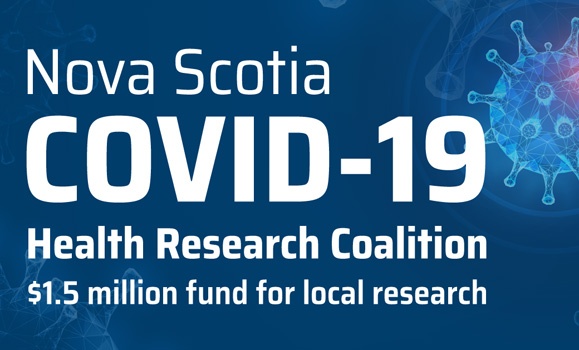In this unprecedented time of local and global uncertainty, there has never been a greater need to conduct medical and health-related research to collect real-time evidence to inform practice, policy and decision-making in this new pandemic environment.
That’s why the Nova Scotia research community has come together to respond to the COVID-19 global pandemic with a collective investment of just over $1.5 million in COVID-19 focused research. On Monday, May 4, the coalition announced the funding of 40 projects.
The Nova Scotia COVID-19 Health Research Coalition is dedicated to fostering a research environment that engages academic partnerships and responds to the current needs of Nova Scotians and the provincial health-care system, in addition to maintaining expertise in innovative research, discovery science, population/social sciences and health system improvement. Members of the coalition include:
• Dalhousie University
• Dalhousie Medical Research Foundation
• Nova Scotia Health Authority
• IWK Health Centre
• IWK Foundation
• QEII Health Sciences Foundation
• Dartmouth General Hospital Foundation, and
• Research Nova Scotia
“We are so very proud to have this amazing group of researchers who are joining in the fight against COVID-19,” says Alice Aiken, vice-president research and innovation at Dal. “The innovative work they are doing will provide real-time results that can be used right here in Nova Scotia, throughout the country, and around the globe.”
The coalition’s funding announcement will support COVID-19 research that will inform health system decisions, facilitate vaccine development, identify novel treatments, develop devices and influence social response to the pandemic. Funding will also leverage existing research capabilities to help rapidly respond to the urgent need to support further COVID-19 focused research right here in Nova Scotia.
"The need is urgent and our call-to-action clear: we must unite to find faster diagnoses, effective treatments and, ultimately, a vaccine that can stop the devastating impacts of this virus," says Joanne Bath, CEO of the Dalhousie Medical Research Foundation. "That’s why we have come together in solidarity to drive crucial health research initiatives.”
Highlights of successfully funded Dal research projects
Researcher: Ingrid Waldron
Faculty: Health
Project: A Culturally Specific COVID-19 Response Strategy for African Nova Scotians in the Prestons
This study will provide solution-oriented recommendations for how clinical services, health promotion, and the collection of disaggregated race-based health data can improve access to COVID-19 testing and health services, and reduce infections by identifying the social determinants that create exposure to and risk for COVID-19 infections and its exacerbation of current illnesses experienced by African Nova Scotians in the Preston communities.
Researcher: Margot Latimer
Faculty: Health
Project: Identifying the Occurrence Rate and Complicating Factors Related to a COVID-19 Diagnosis in the Mi’kmaq People of Nova Scotia
Dr. Latimer’s study, co-led by Mi’kmaq community health leaders, will use a Mi’kmaq-developed health data-linking registry to determine the prevalence and health experience of Mi’kmaq community members in Nova Scotia diagnosed with COVID-19.
Researcher: Amina Stoddart
Faculty: Engineering
Project: UV disinfection protocol for N95 masks
Dr. Stoddart’s project will help to develop an approach to disinfect N95 masks with ultraviolet light, so that they can be reused in the event of supply issues.
Researcher: Christopher Richardson
Faculty: Medicine
Project: Expression and Purification of the Spike Protein (S) of COVID-19 Virus for Diagnostic Purposes and Production of Live Attenuated Viral Vaccines
Dr. Richardson’s project will generate large quantities of coronavirus spike proteins that can be used to produce immune diagnostic kits and in subunit vaccines directed at COVID-19.
Researcher: Sandra Meier
Faculty: Medicine
Project: Use of an App to Determine Mental Health of Population and Health Providers During COVID
Dr. Meier’s study will link mobile sensing and clinical data to assess the impact of social distancing and counterbalancing behaviours on mental health during the COVID-19 crisis and three months later.
A full list of the funding recipients (with descriptions of their projects) can be found here.

